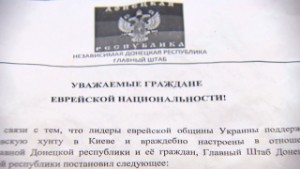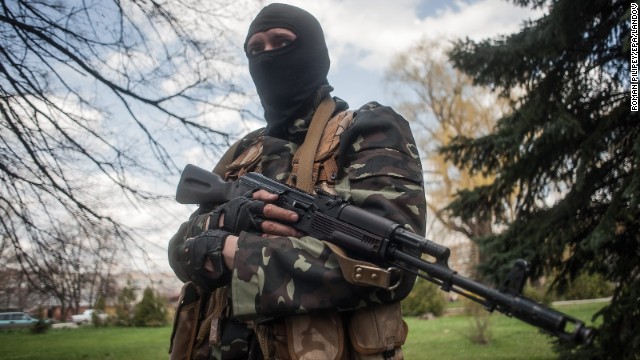How Ukraine crisis could pull U.S. to war
April 18, 2014 -- Updated 1752 GMT (0152 HKT)
STORY HIGHLIGHTS
- Graham Allison: Geneva deal on de-escalation in Ukraine a ray of hope
- He says unless terms are implemented and conflict reversed, civil war still a threat
- He says West does have an interest in stalling Russia-coaxed incursions
- Allison: If Latvia, part of NATO, were next, U.S. could be compelled to enter conflict
Editor's note: Graham Allison is the Douglas Dillon Professor of Government at the Harvard Kennedy School and director of Harvard's Belfer Center for Science and International Affairs. He served as assistant secretary of Defense in the Clinton administration and as an adviser to the secretary of Defense during the Reagan administration. The opinions expressed in this commentary are solely those of the author.
(CNN) -- Despite the ray of good news in Thursday's Geneva agreement on steps to de-escalate the crisis in Ukraine, President Obama was right to sound a note of caution, observing that "I don't think we can be sure of anything at this point."
The deal, reached by Russia, Ukraine and the West, called for, among other things, disarming illegally armed pro-Russian demonstrators in eastern Ukraine, and the surrender of the government buildings they have seized.
These are good and essential first steps, but unless they can now be implemented as a basis on which the parties can move to further, bolder steps to reverse underlying trends, Ukraine could still slide into civil war. If this happened, how would it affect American national interests? Could Ukraine become a 21st century echo of the Balkans in the 1990s, when the collapse of Yugoslavia saw a decade of war between Serbs, Croatians, Bosnians and Kosovars? (No one should forget that just a century ago Ukraine was sucked into a tragic, bloody civil war shortly after gaining independence in the aftermath of the Russian Revolution.)

Graham Allison
There is a saying that history never repeats itself, but it does sometimes rhyme. Fortunately, full-blown civil war in Ukraine still seems unlikely — mainly because one side, the Ukrainian government, appears both unable and unwilling to fight. Nonetheless, it's not hard to sketch a scenario in which war is the outcome -- and from that to envision a further scenario in which the U.S. finds itself drawn into a direct confrontation. (More on that in a moment.)
As we have seen in the past two weeks in eastern Ukraine, Russian speakers— acting either spontaneously, or at the behest of Russian security services, or both — have taken control of government buildings in 10 cities in Ukraine's eastern provinces of Donetsk, Luhansk and Kharkiv. Ukrainian military, security and police forces are so impotent, demoralized and compromised by Russian infiltration that their response has so far been pathetic.
This week, the New York Times reported on the Ukrainian government's "glaring humiliation," when a military operation to confront pro-Russian militants instead saw Ukraine's 21 armored vehicles separating into two columns, surrendering or retreating. In several instances, when confronted by pro-Russian crowds, soldiers and policemen have even switched sides.
If Thursday's deal unravels and Ukrainian authorities remain unable to restore basic law and order, the pro-Russian demonstrators occupying buildings will be emboldened to expand their reach. Further steps may include the demonstrators setting up an independent "republic" in the three Eastern regions and seeking to drive out forces loyal to Ukraine's interim government, provoking the Kiev government to respond with greater force, and then calling in Russian troops to defend them against what they will claim to be "fascists" from western Ukraine.



Responding to a crackdown, Russian security forces would likely provide arms and other assistance to the Russian speakers, claiming that such a call for assistance from "compatriots" is impossible to ignore. As conflict intensifies, western Ukrainians, perhaps even Poles or other Europeans, could come to the aid of Ukraine. In this spiral, one thing could lead to the next, ending in significant bloodshed in eastern Ukraine, and perhaps even spreading beyond.
Widespread violence or civil war would certainly be a calamity for Ukrainians. But would its consequences for American national interests require an American military response? Fortunately for Americans, the answer is no. In 2008, when Russia crushed Georgia in a short war that ended in Russia's recognition of independence for the former Georgian territories of South Ossetia and Abkhazia, that was President George W Bush's answer.
As the ongoing civil war in Syria has claimed more than 150,000 lives, neither President Obama nor his most ardent critics, like Arizona Sen. John McCain, have judged this such an extreme threat to U.S. interests that Americans must kill and to die to stop it.
That the U.S. does not have vital national interests in Ukraine will not mean that the U.S. has no national interest in holding Moscow accountable for violating territorial integrity assurances that Russia and the U.S. gave to Ukraine in 1994 in persuading it to give up nuclear weapons. Indeed, if left to take its course, this crisis has the potential to fuel further developments that engage core American national interests.
For example, if Crimea becomes Putin's precedent for creeping annexation in which Russia-instigated Russian speakers occupy government buildings, liberate a territory and establish a relationship with Russia, where will this stop? Could the 25% of the population in Latvia who are Russian speakers be tempted (or coaxed) to follow suit? (Both Latvians and Russians vividly recall that in 1940 Stalin annexed Latvia, Lithuania and Estonia, nations that regained their independence only in 1991 when the Soviet Union collapsed.)
Russian military intervention in Latvia, even under the guise of special forces in green garb without insignia, would almost certainly be engaged by Latvian military and police. If Russian security forces came to the assistance of their brethren in Latvia, as they would be likely to do, this would mean a direct confrontation between Russia and the U.S.-led NATO.
Many Americans are not aware that Latvia and its Baltic neighbors are members of the NATO alliance, of which the United States is the leader. How many Americans know that members of that alliance, including the United States, commit themselves in Article 5 of the North Atlantic Treaty to regard an attack against one NATO signatory as "an attack against them all"? Pursuant to that commitment, successive American presidents have approved war plans in which Americans would fight to defend the territory of all members of the alliance.
Preventing Ukraine's collapse into civil war must therefore be a high priority for the leaders of both the United States and Russia. The Geneva agreement on "initial concrete steps to de-escalate tensions and restore security," which U.S. and Russian diplomats signed, along with their EU and Ukrainian counterparts, represents the first real step in the international community's collective effort to reverse Ukraine's slide into chaos.
Leaders in both Washington and Moscow will have to follow up with further, bolder steps to prevent Ukraine's spiraling into a civil war that could draw them into a direct confrontation. These additional steps will require all parties to accept arrangements that would be unacceptable — except for the fact that all feasible alternatives are even worse.
Follow us on Twitter @CNNOpinion
Join us on Facebook/CNNOpinion
We recommend
From around the web
Lunar eclipse was welcomed by Celts in ancient times(IrishCentral)
Corporate Mission Statement Examples of What Not to Do(NimbleSchedule)
April 21, 2014 -- Updated 1708 GMT (0108 HKT)
Peter Bergen says the latest strikes are part of an aggressive U.S. effort to target militants, including a bomb maker
April 21, 2014 -- Updated 1345 GMT (2145 HKT)
Cynthia Lummis and Peter Welch say 16 agencies carry out national intelligence, and their budgets are top secret. We need to know how they are spending our money.
April 21, 2014 -- Updated 1235 GMT (2035 HKT)
Julian Zelizer says President Obama knows more than anyone that he has much at stake in the midterm elections.
April 21, 2014 -- Updated 1342 GMT (2142 HKT)
Eric Sanderson says if you really want to strike a blow for the environment--and your health--this Earth Day, work to get cars out of cities and create transportation alternatives
April 21, 2014 -- Updated 1408 GMT (2208 HKT)
Bruce Barcott looks at the dramatic differences in marijuana laws in Colorado and Louisiana
April 18, 2014 -- Updated 2047 GMT (0447 HKT)
Jim Bell says NASA's latest discovery supports the notion that habitable worlds are probably common in the galaxy.
April 18, 2014 -- Updated 1817 GMT (0217 HKT)
Jay Parini says even the Gospels skip the actual Resurrection and are sketchy on the appearances that followed.
April 18, 2014 -- Updated 1752 GMT (0152 HKT)
Graham Allison says if an unchecked and emboldened Russia foments conflict in a nation like Latvia, a NATO member, the West would have to defend it.
April 18, 2014 -- Updated 1311 GMT (2111 HKT)
John Sutter: Bad news, guys -- the pangolin we adopted is missing.
April 21, 2014 -- Updated 1825 GMT (0225 HKT)
Ben Wildavsky says we need a better way to determine whether colleges are turning out graduates with superior education and abilities.
April 18, 2014 -- Updated 1026 GMT (1826 HKT)
Charles Maclin, program manager working on the search and recovery of Malaysia Flight 370, explains how it works.
April 18, 2014 -- Updated 1250 GMT (2050 HKT)
Jill Koyama says Michael Bloomberg is right to tackle gun violence, but we need to go beyond piecemeal state legislation.
April 17, 2014 -- Updated 1845 GMT (0245 HKT)
Michael Bloomberg and Shannon Watts say Americans are ready for sensible gun laws, but politicians are cowed by the NRA. Everytown for Gun Safety will prove the NRA is not that powerful.
April 17, 2014 -- Updated 1328 GMT (2128 HKT)
Ruben Navarrette says Steve Israel is right: Some Republicans encourage anti-Latino prejudice. But that kind of bias is not limited to the GOP.
April 21, 2014 -- Updated 1616 GMT (0016 HKT)
Peggy Drexler counts the ways Phyllis Schlafly's argument that lower pay for women helps them nab a husband is ridiculous.
April 16, 2014 -- Updated 1642 GMT (0042 HKT)
Rick McGahey says Rep. Paul Ryan is signaling his presidential ambitions by appealing to hard core Republican values
April 16, 2014 -- Updated 1539 GMT (2339 HKT)
Paul Saffo says current Google Glasses are doomed to become eBay collectibles, but they are only the leading edge of a surge in wearable tech that will change our lives
April 15, 2014 -- Updated 1849 GMT (0249 HKT)
Kathleen Blee says the KKK and white power or neo-Nazi groups give haters the purpose and urgency to use violence.
Most Popular
Today's five most popular stories






































No comments:
Post a Comment